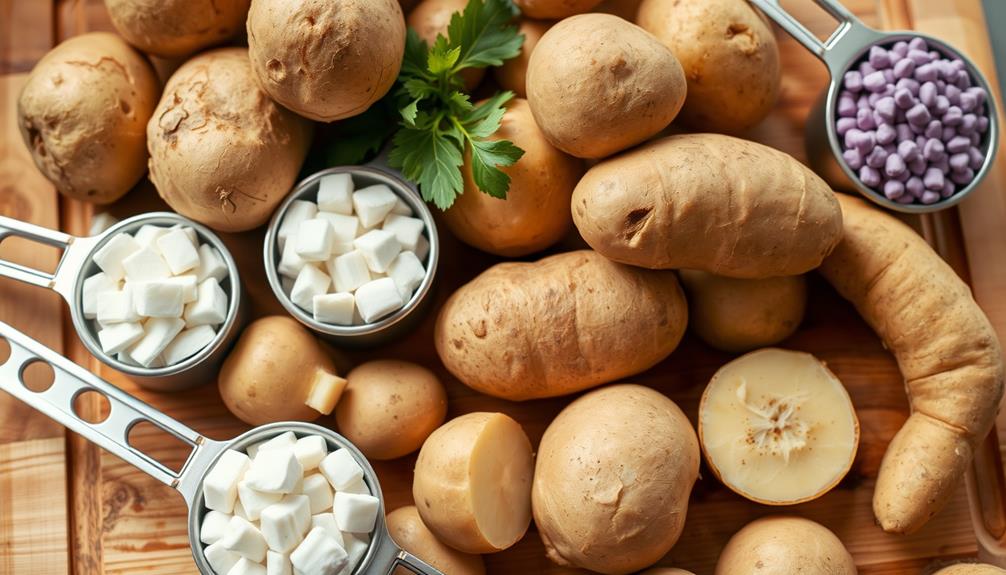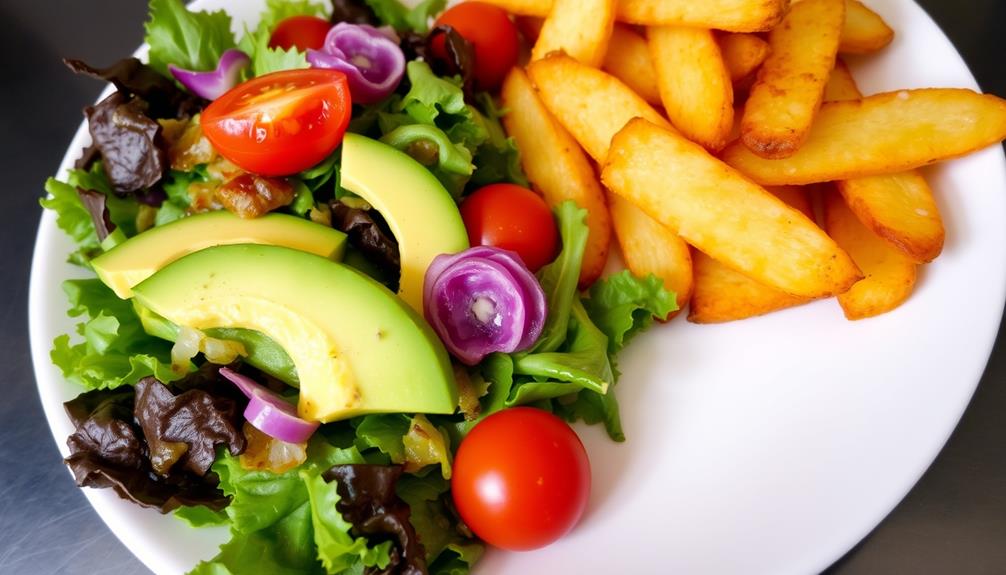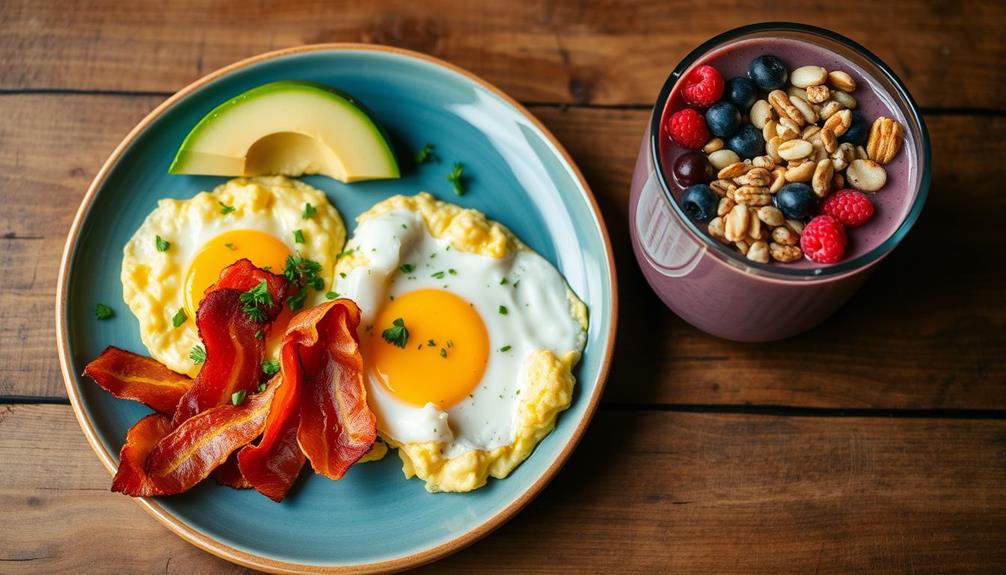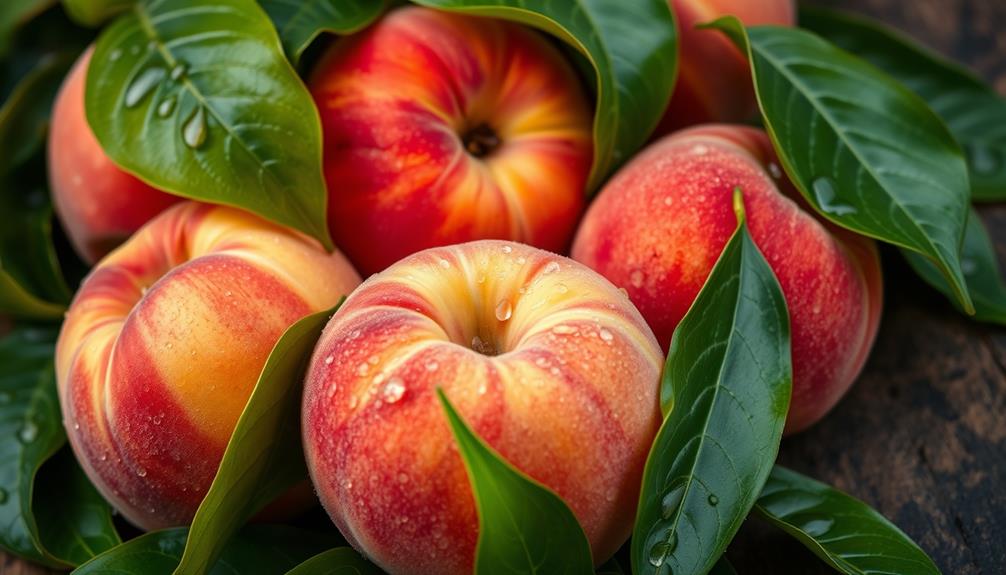You can't eat potatoes on a keto diet without risking your carb limit. A medium potato has about 25 grams of carbs, which can push you over the daily allowance of 20-50 grams. This high carb content can raise your blood sugar levels, making it hard to stay in ketosis. Instead of potatoes, you can opt for low-carb alternatives like cauliflower or turnips, which can satisfy your cravings without derailing your diet. If you're curious about how to incorporate substitutes or manage your carb intake effectively, there's plenty more to explore.
Key Takeaways
- Potatoes are high in carbohydrates, with a medium potato containing around 25 grams, which can exceed the daily carb limit for keto.
- Consuming potatoes can disrupt ketosis, as they significantly raise blood sugar levels and conflict with low-carb dietary goals.
- Alternatives like cauliflower and turnips provide low-carb options that can satisfy potato cravings without derailing your keto plan.
- Resistant starch in potatoes can offer health benefits, but it does not align with the keto diet's focus on low carbohydrates.
- Moderation and portion control are crucial if you choose to include potatoes, but they are generally not recommended for a strict keto diet.
Understanding the Keto Diet

To kick off your journey with the ketogenic diet, it's essential to grasp its core principles. The keto diet is a high-fat, moderate-protein, and low carb approach that typically limits carbohydrate intake to about 20-50 grams daily. This restriction encourages your body to enter ketosis, a metabolic state where it burns fat for fuel instead of high in carbs, leading to the production of ketones as an alternative energy source.
Incorporating a well-structured budget for meal planning can help you stay on track with your dietary goals.
To maintain ketosis, you'll need to avoid starchy vegetables, grains, legumes, and sugary fruits. These foods can spike your blood sugar levels, affecting your insulin sensitivity and potentially knocking you out of ketosis.
Initially, you might experience symptoms commonly referred to as "keto flu," including fatigue and headaches, as your body adjusts to this new energy source.
Long-term adherence to the keto diet can promote significant weight loss, primarily from fat loss. However, keep in mind that its restrictive nature may raise concerns about meeting your nutritional needs.
Balancing your diet is vital to avoid potential nutrient deficiencies while still achieving your weight loss goals. Understanding these fundamentals lays the groundwork for your ketogenic journey.
Potatoes and Their Carbohydrate Content

Potatoes are often a staple in many diets, but when it comes to the ketogenic lifestyle, their carbohydrate content poses a significant challenge. A medium potato contains about 25 grams of carbohydrates, which can easily exceed your daily carb limit for a ketogenic diet. Since maintaining ketosis typically requires you to stay between 20 to 30 grams of carbs, just one potato can jeopardize your efforts.
Additionally, the high carbohydrate content in potatoes can lead to unwanted increases in blood sugar, making it essential to monitor your food choices closely. Potatoes have a glycemic index nearly three times higher than that of white bread, causing substantial spikes in blood sugar levels. This rapid fluctuation can hinder your ability to maintain ketosis, making it difficult for low carb dieters to achieve effective weight loss.
High carbohydrate foods like potatoes conflict with the low carb dietary goals vital for a successful ketogenic lifestyle. For those looking to maintain a healthy diet, incorporating foods rich in antioxidants and vitamins can provide beneficial alternatives.
If you're aiming for ketosis, it's important to be mindful of food choices. Including potatoes in your diet can lead to unwanted increases in blood sugar and derail your weight loss journey. As a result, it's wise to steer clear of potatoes and focus on low carb alternatives that support your ketogenic goals.
Resistant Starch and Its Benefits

Resistant starch is a unique type of carbohydrate that doesn't break down into glucose during digestion, making it an intriguing option for those on a ketogenic diet. This special starch can greatly boost your gut health by serving as food for beneficial gut bacteria, which, in turn, promotes the production of short-chain fatty acids (SCFAs) like butyrate.
Understanding the impact of various dietary choices, including coffee's health benefits, can additionally complement your approach to nutrition. To reap these benefits, aim for a daily intake of 30-40 grams of resistant starch from sources such as unmodified potato starch and cooked-and-cooled starchy foods.
Cooling cooked starchy foods, like potatoes and rice, can enhance their resistant starch content by 10-15 times. This increase can help improve insulin sensitivity and reduce postprandial glycemia, making it easier to manage your weight by promoting feelings of fullness.
Moreover, diets high in resistant starch may play a role in cancer prevention, particularly colorectal cancer, by stimulating SCFA production, which can induce apoptosis in cancer cells. By incorporating resistant starch into your diet, you're not just enhancing your meals but also taking proactive steps toward better health.
Moderation and Portion Control

Balancing your potato intake on a keto diet requires careful consideration of moderation and portion control. Since a medium potato contains around 25 grams of carbs, it can quickly push you beyond your daily limit of 20-30 grams, hindering your journey into ketosis.
To maintain a healthy balance, consider exploring alternatives for common health issues, such as using essential oils for toothache relief to avoid discomfort that might lead to unhealthy snacking.
Here are some tips to help you manage your potato consumption:
- Measure Portions: Always weigh or measure your potato servings to guarantee you stay within your carb limits.
- Choose Smaller Servings: If you indulge, opt for a very small portion to minimize the impact on your total carbohydrate intake.
- Monitor Hidden Carbs: Be vigilant about hidden carbs in dishes that contain potatoes. Read food labels and track everything you eat.
- Consider Low-Carb Alternatives: Substitute potatoes with lower-carb options, like cauliflower or turnips, to satisfy cravings without derailing your diet.
Alternatives to Potatoes on Keto

When you're on a keto diet, finding satisfying substitutes for potatoes can make a world of difference in your meal planning. Cauliflower is one of the most popular options; you can mash or bake it to achieve a similar texture while keeping your carb intake low.
Additionally, incorporating a balanced diet rich in whole foods can help maintain overall health, making these alternatives even more beneficial effective strategies for weight loss. Turnips offer a slightly sweet flavor and can be incorporated into various dishes, providing a versatile alternative.
Daikon radish is another great choice. Slice and bake it to mimic scalloped potatoes without the carb load. If you're craving something crispy, jicama and rutabaga can be transformed into delicious fried snacks, satisfying your cravings without derailing your diet.
These alternatives aren't only low in carbs but also high in fiber, which can help with digestion. Experimenting with different cooking techniques, like roasting or steaming, can enhance their flavors.
Drizzling them with healthy fats, such as olive oil or butter, adds richness and makes these substitutes even more enjoyable. By incorporating these options into your meals, you can easily enjoy the comfort of potato-like dishes while sticking to your keto lifestyle.
Frequently Asked Questions
How Much Potato Can I Eat on Keto?
You shouldn't eat potatoes on keto. Even a small portion can exceed your daily carb limit, making it tough to stay in ketosis. Focus on low-carb veggies to keep your diet on track and effective.
What Are the Top 10 Keto Foods?
When you're crafting your keto menu, think of vibrant, low-carb treasures like fatty fish, colorful veggies, rich dairy, luscious avocados, and crunchy nuts. These delightful options keep you satisfied while steering clear of excess carbs.
What Vegetables Can I Eat on Keto?
On a keto diet, you can enjoy low-carb vegetables like broccoli, cauliflower, and spinach. These options keep your carb intake low while providing essential nutrients, helping you maintain ketosis and support your overall health.
What Veggies Are Not Keto-Approved?
You should avoid starchy vegetables like potatoes, corn, and yams. Root vegetables, high-sugar fruits, and legumes aren't keto-approved either, as they can disrupt your ketosis and increase your daily carb intake considerably.
Conclusion
To sum up, while potatoes might tempt you like a sweet siren, they're not the best choice for a keto diet due to their high carbohydrate content. Instead, focus on low-carb alternatives that satisfy your cravings without knocking you out of ketosis. With a bit of creativity and portion control, you can enjoy delicious meals that keep you on track. Remember, staying committed to your goals is key, so choose wisely and savor every bite!









